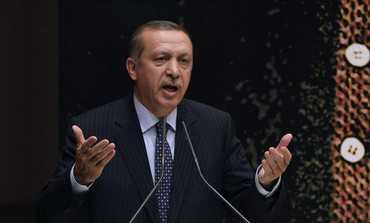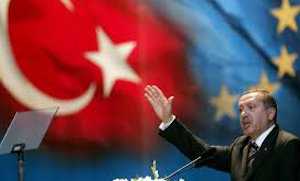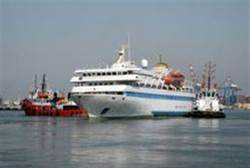Turkey and Israel: A ‘what next?’ mindset
At this point, the critical question is how to turn the forthcoming strategic dialogue into strategic cooperation.

Meanwhile, many columnists voiced their opinions about who should take credit for this critical development; some praised the Turkish foreign policy that succeeded in making Israel apologize, others praised Prime Minister Binyamin Netanyahu for his strategic wisdom, and of course US President Barack Obama for his excellent mediation skills. There were even academics who discussed whether the Israeli government did or did not exactly apologize. Although these issues might be very attractive to read about in foreign policy columns, they don’t make much sense at all in the “Hobbesian real world of the Middle East” which is “nasty and brutish” indeed.
Instead of all endless “why, how, and what happened exactly” debates, this paper prefers to focus on the vital question of “what to do next, and how to accomplish it.”
From Détente to strategic dialogue: Following “the apology and the positive response,” now we have a détente in Turkish- Israeli relations that offers a cautious optimism for the future. The first and foremost requirement should be turning this détente into a strategic dialogue.
Having political figures from both countries photographed shaking hands would just be a PR effort. Instead, we, the Turks and the Israelis, right away need our experts to talk openly about Syrian chemical and biological agents’ locations, Assad’s ballistic missiles’ combat-readiness, and trajectory of the Syrian civil war. Likewise, a rise in tourist exchange would be nice in order to overcome mutual distrust in people-to-people relations. However, more urgently, we need our think-tanks setting forums for brain-storming about Iran’s military trends and nuclear program.
In sum, we need a comprehensive strategic dialogue to compensate for the times days of deterioration in Turkish-Israeli relations. As the author of this op-ed has stated, when the crisis between the two nations culminated in the flotilla incident, “Bouazizi was still alive in Tunisia, Ankara and Damascus were holding joint cabinet meetings, and Iranian officials hadn’t threatened Turkey due to NATO assets on Turkish soil.” In other words, while we were having problems in our marriage, the neighborhood was only as dangerous as usual; but now everywhere is on fire and we have really serious issues to handle.
From strategic dialogue to cooperation Upon a comprehensive strategic dialogue on key issues of Turkish and Israeli national security agendas, decision-makers of both sides would need to develop a robust cooperation to confront the drastically worsening landscape of regional threat.
As PM Netanyahu pointed out immediately after he initiated the US-brokered rapprochement, the most critical strategic priority would be Syria’s prolonged civil war. Within this context, Turkey and Israel have to get ready to secure the Baathist tyranny’s chemical and allegedly biological weapons arsenal along with other strategic weapons systems in case of an uncontrolled regime collapse. Furthermore, we also need to carefully watch for any mass transfer of game-changing weapon systems in asymmetric conflicts, such as man portable air defense systems (MANPADS), and antitank guided missiles (ATGM) into the hands of non-state groups that might target Turkey or Israel. In a moment of irrational shock, Assad or members of the elite surrounding him might attempt to ignite a regional war by provoking Turkish or Israeli administrations. In this case, the two nations need to be prepared to act in coordination, to nip the threat in the bud.
At this point, the critical question is how to turn the forthcoming strategic dialogue into strategic cooperation. While everyone recalls the strategic partnership in the 1990s between Turkey and Israel, during the years of deterioration of their relationship the author of this op-ed has tried to point out the presence of another cooperation model in Turkish- Israeli relations, namely, the peripheral pact signed in 1958. This model was narrowly-designed to cover specifically determined military-political affairs, and was handled within a limited community of top decision makers. Although the current rapprochement is an overt development, we should also take the two countries’ domestic political constraints into consideration. Israel has just formed a new government with the participation of right-wing and centrist figures that excluded the ultra- Orthodox. On Turkey’s end, municipal, parliamentary and presidential elections will take place only in two-a-half years, although constitution debates are ongoing. Moreover, both Israel’s apology and Turkey’s positive response are “security-oriented” to a large extent, and the two states will have to deal with very critical threats.
Who would say no to some extra benefits Although the US-brokered restoration is taking place out of national security urgencies on both sides, Turkish- Israeli relations have always had the potential to produce momentous results. The first prospective development might be a come-back in military ties. As the relations normalize, frozen military deals can be gradually revived. In that sense, Turkey’s ongoing efforts in promoting missile defense capabilities, drone warfare and armor modernization would be attractive to the Israeli defense industry. Moreover, the two countries can restart naval and air force drills and Turkey might drop its veto on NATO-Israeli cooperation, as things get better. More importantly, effective energy cooperation in the Eastern Mediterranean would a bright idea, especially when the Greek Cypriots are swamped with their banking crisis and corrupt governance; Turkey and Israel can work on an alternative energy corridor that would be much more beneficial.
In the long run, if everything goes even better than expected, the special relations between Turkey and Azerbaijan, and Israel’s close defense and intelligence cooperation with Baku can be enhanced to prompt a trilateral partnership to counterbalance the Iranians’ aggressive agenda.
In sum, the most important bilateral ties of the Middle East, relations between the only two democracies of this dangerous region, might be on the eve of a major restoration. The crucial track would be driving this prospect into a strategic dialogue, and then an effective cooperation. However, at this point we should keep an eye on Palestinian affairs and Lebanon, where anyone who is uncomfortable with Turkish-Israeli partnership might try to provoke an Israeli military action, and thereby, a Turkish diplomatic reaction. If Turkish and Israeli officials want to keep their rapprochement safe, they should remember that on one hand there are the likes of Obama, who is happy with how things are going so far. Nevertheless there are some others who are already starting to go mad to see the Turks and the Israelis acting in coordination in Syria.
The writer, who holds a Ph.D. from the Turkish War College, served as a post-doctoral fellow for the BESA Center at Bar-Ilan University. He is currently a research fellow at the Istanbul based Turkish think-tank EDAM.




